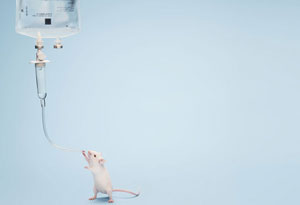A Vaccine for Breast Cancer?

Photo: Levi Brown
A potential vaccine has made headlines, but researchers still must prove that it will work in women.
Imagine if you could reduce or even eliminate your risk for breast cancer with just the prick of a needle. You may have heard about a new vaccine with the potential to stop many breast tumors in their tracks. But is the buzz warranted?
The proposed vaccine targets alpha-lactalbumin, a protein found in the majority of breast tumors. Just as a flu shot uses a dead or weakened strain of the flu virus to ramp up your body's immune defenses against the invader, this vaccine uses a small amount of alpha-lactalbumin (mixed with a chemical irritant) to convince your immune system that the protein is a threat.
Although the science is promising, researchers at the Cleveland Clinic have so far tested the vaccine only on a group of genetically engineered cancer-prone mice. Eight months after getting the shot, none of the vaccinated mice had breast cancer; by contrast, every mouse that received the placebo developed tumors. In a second test, the vaccine slowed tumor growth in mice that already had cancer.
Impressive results, but it remains to be seen whether the vaccine will be as successful in humans. "If everything that worked in mice also worked in people, we would have gotten rid of cancer decades ago," says Larry Norton, MD, deputy physician in chief for Breast Cancer Programs at Memorial Sloan-Kettering Cancer Center.
The next step: human clinical trials to test the vaccine's effectiveness and safety, as well as determine the appropriate dosage and scheduling. If no serious complications arise, the Cleveland Clinic researchers say the vaccine could be available from your doctor ten years from now.
More about breast cancer...



